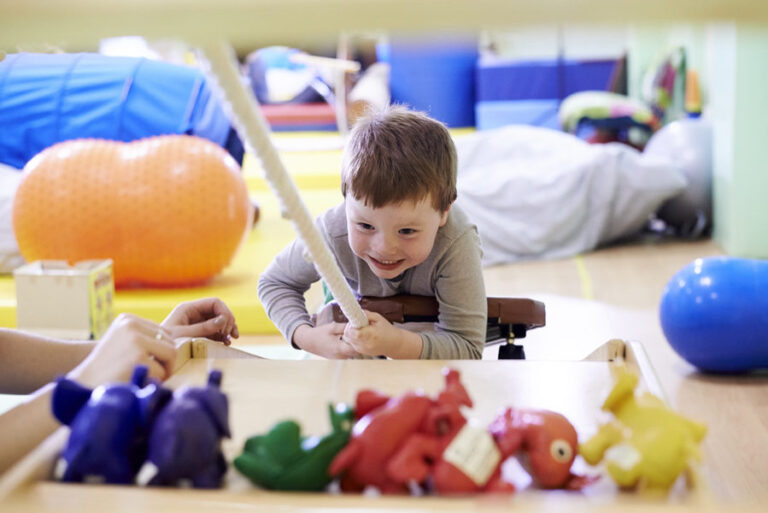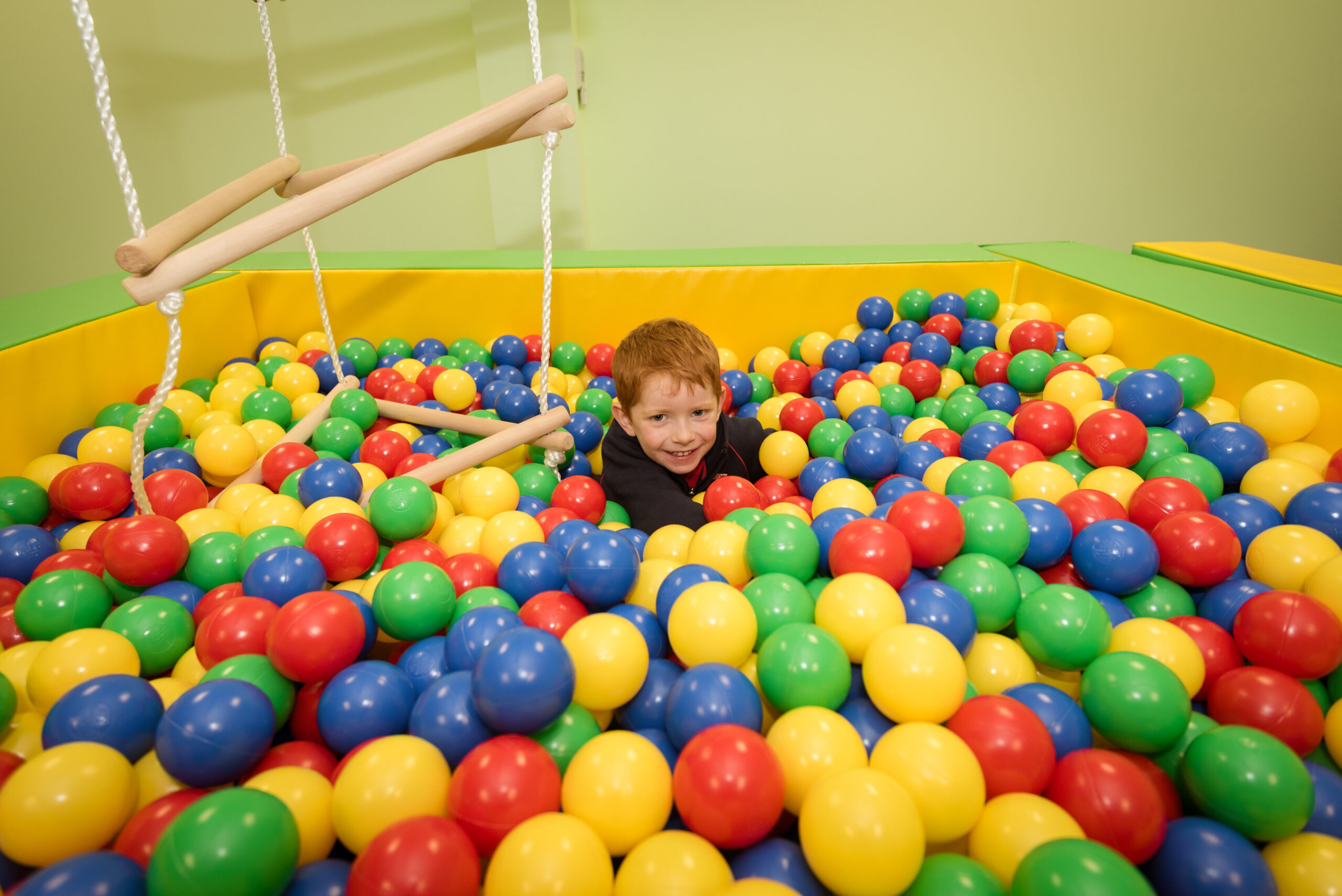Sensational Kids operates four provincial child development centres in counties Kildare, Mayo, Cork and Monaghan, all offering subsidised occupational therapy. The occupational therapists at Sensational Kids provide holistic child and family centred therapy. We believe that creating strong therapeutic relationships is key to a child’s successful therapeutic journey.
- Our clinical team are supported and trained by our experts in sensory integration ensuring that children with sensory needs are receiving evidence based sensory therapy to Ayres Sensory Integration® international standards.
- Special Interest in Sensory Integration with bespoke Sensory Motor Gym Facilities: Sensational Kids Child Development Centres provide specialist sensory motor gym facilities to meet the often complex sensory needs of the children we support. Sensory-motor skills are foundational for physical, cognitive, and social development, influencing a person’s ability to navigate and interact with the world.
Who Is OT For?
OT supports children and adolescents, with additional needs, to maximise their potential through therapeutic intervention. We support the development of specific skills and underlying developmental components, i.e. sensory, gross motor, fine motor, cognitive and social to ensure that children achieve their maximum functional independence in everyday activities:
- At home (e.g. eating, dressing, toileting)
- At preschool (e.g. drawing, cutting, colouring, playing)
- At school (e.g. handwriting, sustained posture at the desk, focus and concentration, task organisation)
- In social situations.
We support children and adolescents including those with developmental delays and diagnosis including:
- Autistic Individuals
- ADD/ ADHD
- Developmental Coordination Disorder (Dyspraxia)
- Down Syndrome
- Foetal Alcohol Syndrome
- Fragile X Syndrome
- Intellectual Disability
- Sensory Processing Difficulties
- Pre & Non Verbal Children
Our Models of Practice
At Sensational Kids our therapy support team employ the following models of practice:
- Ayres Sensory Integration®
- Trauma informed approach
- Neuroaffirmative
- Perceptual Motor
- Sensory Motor
- The CO-OP approach: a child centred, performance-based, problem solving approach that enables skill acquisition through the process of strategy use and guided discovery
- DIR floortime
- SOS Feeding
- CBT (cognitive behaviour therapy)
- Person centred and trauma informed practice
Demonstrating the depth and range of the skills and expertise of the paediatric occupational therapy supports available from Sensational Kids.
What Skill Areas Can Be Addressed Through Occupational Therapy?
Fine Motor Skills
Includes: Strengthening, Endurance, Dexterity – isolated finger movement, Pre-writing skills, Handwriting, Dressing, (buttons, zips, shoelaces), Feeding – managing utensils, Strengthening, Endurance.
How a Child May Present: Poorly developed pencil grasp, difficulty with opening snacks and lids on tubs or bottles, threading beads, posting coins, drawing, colouring, cutting, writing letters and numbers, doing buttons and zips, tying shoelaces, using a spoon etc.
Gross Motor Development
Includes: postural control and core stability, balance and equilibrium, ball skills and transitional movement patterns, Integrated movement patterns, Transitional movements, eye hand coordination, eye foot coordination, postural strengthening & shoulder girdle stability
How a Child May Present: Difficulty with climbing, jumping, running, hopping, playing balancing games and ball games, child may have poor endurance, have difficulty sitting up straight at the desk or on the mat, get tired when having to stay in one position for too long or may get tired easily when playing sports games.
Activities of Daily Living
Includes development of skill and independence in Dressing, Feeding, Toileting, Bathing, Grooming, and Sleeping Routines.
How a Child May Present: May be unable to dress themselves, bathe, brush teeth or toilet independently and may require support that is greater than what is expected for a child of their age.
Cognitive Skills and Executive Function
Includes memory (visual and auditory), sequential memory, working memory, following of instructions, impulse control, focus and concentration, task organisation and time management, use of cognitive strategies, ie visual schedules, and token economies.
How a Child May Present: May have difficulty with task organisation, understanding and following instructions in the classroom, starting and finishing a task on time, difficulty planning what needs to be done and the order in which a task needs to be completed, may be easily distracted and need repeated reminders or prompts, may have difficulty controlling their behaviour.
Social Engagement
Includes peer engagement skills, ie sharing, waiting, turn-taking.
How a Child May Present: Difficulty playing games with peers, may become frustrated when they have to wait, may not like to share toys, may have difficulty initiating play effectively, may struggle with winning and losing.
Visual Perceptual Skills
Includes visual figure ground, visual discrimination, visual closure, visual motor integration, visual spatial relationships and position in space.
How a Child May Present: Difficulty matching shapes or seeing differences in pictures, struggles with block building and puzzles, difficulty with reading and writing, copying off the board or out of a book, learning how to draw shapes, letters and numbers, may lose their place when copying down information or reading, difficulty organising information on a page, may struggle with consistent letter sizing and spacing when writing.
Sensory Processing
Includes sensory and emotional regulation, sensory motor based skills – body schema development, bilateral motor coordination, motor planning and sensory discrimination
How a Child May Present: meltdowns, distractibility, over-reactivity, avoidance, withdrawal and poor frustration tolerance, delayed acquisition of
movement skills, poor coordination (skipping, galloping, riding a bicycle, swimming) difficulty controlling movements and learning new skills.
Mental Health
Includes stress management. relaxation techniques, coping strategies, assertiveness, emotional expression, cognitive reframing, problem solving, self-esteem and self-expression, trauma processing and resolution, boundaries, empathy and perspective taking.
How a Child May Present: increase or sudden onset of challenging or reactive behaviour, changes in sleep patterns or diet, increased restlessness or fidgeting, withdrawal from friends or favourite activities, school refusal, changes in academic performance, mood swings, difficulty concentrating, lack of motivation and energy, increased anxiety or fears that interfere with daily activities.











